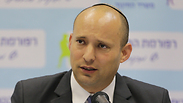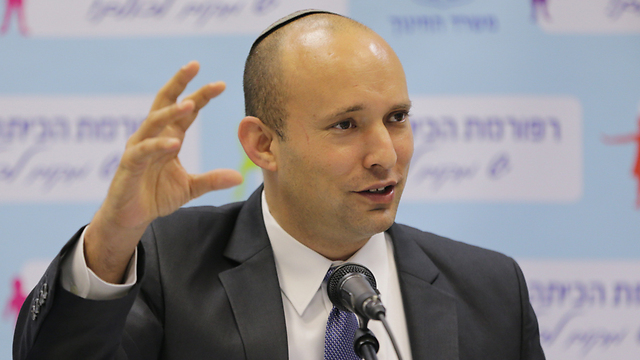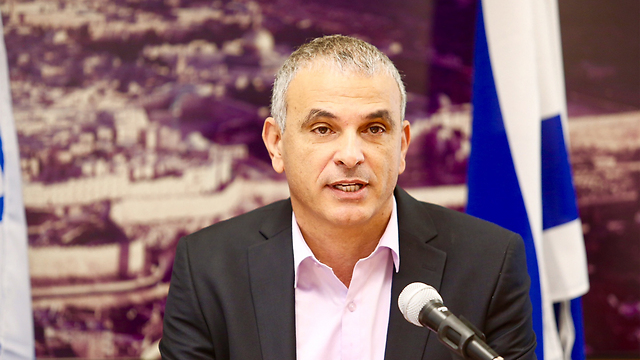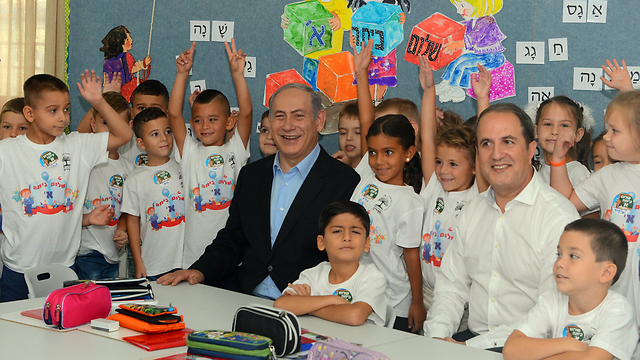
Education Ministry budget at record high, many additions to go to religious institutions
For the first time, the ministry's budget will stand at over NIS 50 billion, while the department's declared priorities are in contrast with the actual allocations for much of the added funds.
Israel's 2015-2016 budget, which passed the first round of votes in the Knesset on Wednesday, includes significant additions to education, which put the ministry's budget above NIS 50 billion for the first time. The education budget is expected to grow by NIS 7 billion, after 4.9 billion were added to the 2015 budget and about 2 billion added to the 2016 budget.
However, the budgetary proposal provided by the Finance Ministry shows a contradiction between the official priorities of the Education Ministry, as reflected by the proposal, and the way the additional budget is being allocated.
While the budget proposal lists developments in early education, lowering classroom sizes, and improving students' math skills as top priorities, a large slice of the pie is actually set to go towards the haredi and national-religious education systems, as well as enhancing education on religious subjects. This is in accordance with agreements made by the Likud party and religious parties in the government during coalition negotiations after the March 2015 elections.
The price of coalition agreements
At the top of the department of education's priority list for 2015-2016 is the task taken on by the government after the protests of summer 2011: Supplying education opportunities for children, beginning at age 3. To achieve that, the department's budget was increased, so that a second assistant can be added to pre-school classes with over 29 children.
Other sums were also added in accordance with a multi-year plan that was agreed upon in 2012.
The department's second-highest priority is improving the teacher-to-student ratio by lowering the number of students in each class to 32-34, and adding another teacher in certain classrooms. The next priority is improving students' achievements and skills in mathematics. After that is the goal of increasing the differential budgeting, which is meant to shrink the gap between the education systems of rich and poor municipalities.
Coalition promises comprise a significant amount of added funds in the 2015-2016 budget, which are 14.2 percent of the total sum. The budget proposal defines these as "implementation of the agreements with the Shas, United Torah Judaism, and Bayit Yehudi factions, and in accordance with the government's decisions on the matter. Among the budgeted subjects – increasing the yeshivas budget, improving services at public religious schools, and haredi education."
The investment in early education was also given a significant chunk of the funds at 12 percent. Lowering the number of students per classroom was allocated just 2.4 percent of the total sum, and the other department of education priorities were not given specific fund allocations.
NIS 1 billion a year for support of Jewish subjects
According to the Knesset Research and Information Center (KRIC), the national education system hasan average of 29 students per classroom, with 24.8 in the public religious system and 23.9 in the haredi system.
Following the coalition agreement-related additions, the aspect that's expected to see the largest comparative increase of all is "support of Jewish subjects", which includes the plans for Jewish culture and support of Jewish religious institutions.
This area only covers 2 percent of the department of education's total budget, but it is expected to grow by 77 percent in the 2015-2016 budget, while other areas are increased by 10-25 percent, or even less.
Starting in 2015, Israel will in vest over NIS 1 billion a year in support of Jewish subjects. The budget proposal states that "the change comes from an increase in coalition budgets, in accordance with government decisions on the subject."
The Education Ministry said in response: "The base of the Education Ministry's budget has grown significantly from NIS 43.59 billion in 2014 to NIS 50.59 billion in 2016. As the transition table in the budget book indicates, the vast majority of the added funds is intended for top priority subjects, such as continued reforms in elementary and high school education (which include, among other things, improving teacher employment conditions and empowering school principals), improving early education (free education starting at age 3 and the second assistant reform), plans intended for economically weaker populations (a hot meal for students, subsidies of summertime education in peripheral areas, the differential budgeting program), strengthening technological and mathematical education, and more."
"Out of the NIS 7 billion addition to the department of education's base budget in these years compared to 2014, about NIS 985 million of the department's budget is comprised of coalitional funds. It should be emphasized that a significant part of these funds is dedicated to subjects that have across-the-board benefits for all Israeli children, as opposed to serving one sector or another."













